StoryADay May 2016 may be over, but the writing goes on: tell us your commitments for June, and get ready for the 7DayStory course and, of course, StoryFest, our annual celebration of the story!
OHMYGOODNESS I can’t believe StoryADay May 2016 is over! I’m relieved, I’m distraught, I’m going to miss checking in every day and seeing all the new stories and new friends appear. BUT IT DOESN’T HAVE TO END! Here’s the Serious Writers’ Accountability Group, to keep us all together throughout the rest of the year.
Next week I’m running the #7DayStory email course (Write, Revise & Release a short story in a week). More details to come!
And don’t forget STORYFEST 2016 is coming, June 10-12: a celebration of the stories you’ve written and the friends you’ve made. Watch your inboxes for details.
Every month we gather here to discuss what we’ve achieved and commit to making more progress in our creative lives in the coming month. We call it our Serious Writer’s Accountability Group or SWAGr, for short! (We’re serious, not sombre!)

Leave a comment below telling us how you got on last month, and what you plan to do next month, then check back in on the first of each month, to see how everyone’s doing.
(It doesn’t have to be fiction. Feel free to use this group to push you in whatever creative direction you need.)
Did you live up to your commitment from last month? Don’t remember what you promised to do? Check out the comments from last month.
And don’t forget to celebrate with/encourage your fellow SWAGr-ers on their progress!
****
Examples of Goals Set By SWAGr-ers in previous months
- Write a story a day in May – everyone!
- Revise at least 10 short stories – Iraide
- Write two short stories. – Jami
- Attend one writers’ conference – Julie
- Write fable for WordFactory competition – Sonya
- Re-read the backstory pieces I wrote in May and see if I can use them within my novel – Monique
- Research the market – Jami
- Focus on my serial – Maureen
So, what will you accomplish this month? Leave your comment below (use the drop-down option to subscribe to the comments and receive lovely, encouraging notifications from fellow StADa SWAGr-ers!)
(Next check-in, 1st of the month. Tell your friends. )


Don’t forget, if you need inspiration for a story you can still get ALL THE PROMPTS from StoryADay May 2016 and support the running of the StoryADay challenge at the same time. (I’m really proud of this year’s collection!) Give a little, get a little  Click here. Now only $2.99
Click here. Now only $2.99






